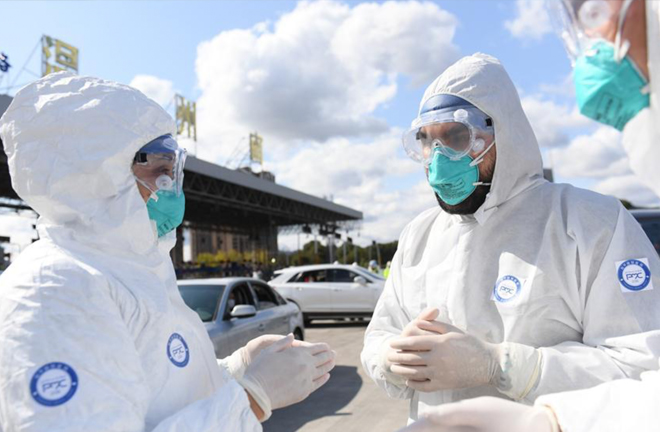Int’l cooperation needed to fight NCP

Two Pakistani doctors work with a local colleague to help curb the spread of contagion, in Wenzhou, Zhejiang Province, Feb. 8, 2020. Scholars throughout the world are calling on all parties to enhance multilateral cooperation. Photo: Weng Xinyang/XINHUA
BOSTON—Since the outbreak of novel coronavirus pneumonia (NCP), the Chinese government and its people have been making an all-out effort to fight an arduous war. Meanwhile, scholars throughout the world are calling on all parties to enhance multilateral cooperation and construct mechanisms to curb the spread of contagion.
Tedros Adhanom Ghebreyesus, director-general of the WHO, said that the WHO has spoken highly of the decisive measures that China has taken, which reflects China’s high sense of responsibility not only for its own people but also for reducing the spread of the virus to other countries.
In response to the China-related travel bans imposed by many countries and territories, Tedros called on the international community to remain calm and not overreact. Countries need to take all factors into consideration and adopt scientific and rational precautionary measures.
Peter Jay Hotez, dean of the National School of Tropical Medicine at Baylor College of Medicine, said that China has taken strict and comprehensive prevention and control measures. The WHO declared a global public health emergency against the coronavirus mainly to protect countries with poor public health capabilities. Overreaction does nothing but hinder global cooperation.
A visiting scholar at Harvard Medical School said that his ethnic Chinese colleagues have been following the epidemic closely. Many people around him have even gone to China to offer their help. The scholar believed that the medical community should offer more humanitarian aid to China, a responsible and helpful country that deserves more support from the international community.
The WHO announced that the organization will convene a global research and innovation forum to mobilize international action in response to NCP. The forum will be held Feb. 11–12 in Geneva. It will be co-organized by the WHO and the Global Research Collaboration for Infectious Disease Preparedness. The forum will bring together key players including leading scientists as well as public health agencies, ministries of health and sources of funding for NCP critical animal and public health research and for the development of vaccines, therapeutics and diagnostics, among other innovations.
Soumya Swaminathan, chief scientist at the WHO, said that in order to control the outbreak, reduce deaths and minimize the economic impact, it is important to understand the disease, its reservoirs, its transmission and its clinical severity before effective counter-measures can be developed. Meanwhile, mechanisms will be set up to ensure affordable access for the vulnerable.
“The WHO R&D Blueprint is a global strategy and preparedness platform that drives coordinated development of drugs and vaccines before epidemics and allows the rapid activation of R&D activities during epidemics. It speeds up the availability of the diagnostics, vaccines and treatments and technologies that ultimately save lives,” said Dr. Michael Ryan, executive director of the WHO Health Emergencies Programme.
Maria Van Kerkhove, an infectious disease epidemiologist with the WHO, stressed the importance of sharing biological samples. Laboratories in many countries and regions including the US, France, Germany and China’s Hong Kong SAR are getting ready to share the virus samples they have extracted from their local patients.
According to a recent article in Nature, as of Jan. 30, over 50 English-language papers about the NCP had been released over the past 20 days. Considering the dire situation of the pandemic, it is essential to share the scientific results throughout the global medical community.
Regarding information asymmetry, Michael Mina, an assistant professor of epidemiology at Harvard School of Public Health, pointed out that as the figure of confirmed cases and death toll continue to rise, people’s panic could easily derail them from the fundamental facts including the actual number of infected people and the virus’s actual contagiousness and spreading speed. Some people are sowing fear over social media, where unconfirmed information can go viral and cause global panic. Mina concluded that it is important to verify the source of information, so as to prevent information chaos from misleading the direction of scientific research.
Western scholars voiced that the international community should give China greater support. Overcoming the epidemic is the common goal of mankind. Only when the whole world works together can we defeat our common enemy as soon as possible.
edited by WENG RONG
